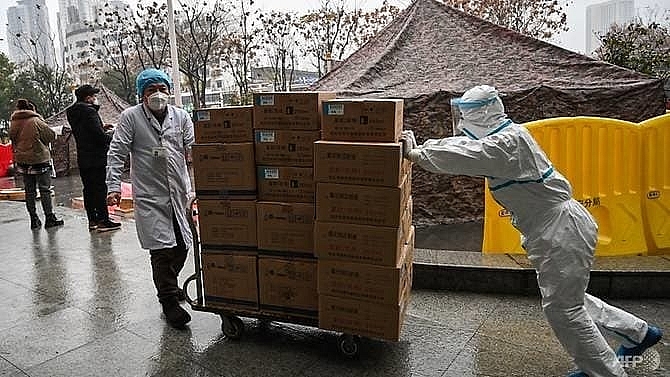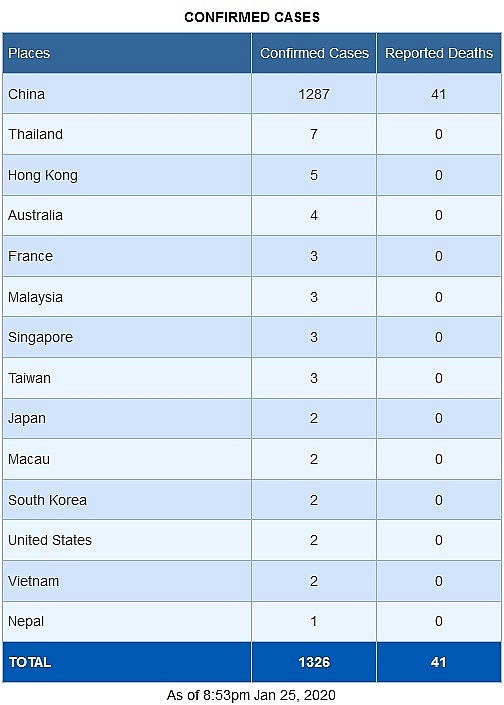Vast Wuhan virus quarantine in China as cases emerge in Europe, South Asia
 |
| Medical staff wearing protective clothing to help stop the spread of a deadly virus which began in the city, transport supplies at the Wuhan Red Cross Hospital in Wuhan on Jan 24, 2020. (Photo: AFP/Hector Retamal) |
China on Friday imposed transport bans in an area covering a staggering 41 million people, as the United States confirmed its second case of the SARS-like virus that has reached almost a dozen countries.
The virus has also spread to densely populated South Asia, where Nepal confirmed one case, and Europe, where three cases were reported in France.
With more than 800 cases logged in China so far, a range of Chinese New Year festivities have been cancelled, with temporary closures of Beijing's Forbidden City, Shanghai's Disneyland and a section of the Great Wall to prevent the disease from spreading further.
 |
The previously unknown virus has caused alarm because of its similarity to SARS (Severe Acute Respiratory Syndrome), which killed hundreds across mainland China and Hong Kong in 2002-2003.
The World Health Organization said China faced a national emergency but stopped short of declaring a global health emergency, which would have prompted greater global cooperation.
The outbreak emerged in late December in Wuhan, an industrial and transport hub of 11 million people in China's centre, spreading to several other countries.
Australian authorities confirmed its first case on Saturday, after a patient who returned to Melbourne from Wuhan tested positive for the virus.
In the United States, a woman in Chicago became the second known patient on US soil, with 50 other suspected cases under investigation. A city health official said on Friday the woman was doing well and in stable condition.
Hours after the announcement President Donald Trump thanked Chinese President Xi Jinping via Twitter "on behalf of the American People" for his country's "efforts and transparency" in working to contain the virus. "It will all work out well," Trump wrote.
The first case in South Asia was reported in Nepal on Friday. The 32-year-old male patient, who had arrived from Wuhan, was treated at a hospital in Kathmandu and discharged, officials said. In photos: Asia ramps up defence against Wuhan virus
And three cases were confirmed in France, the first in Europe. All had recently travelled to China and have been placed in isolation, the country's health minister said.
China is in the midst of its Chinese New Year holiday, a typically joyous time of family gatherings and public festivities.
But on Friday Wuhan was a ghost town, its streets deserted and stores shuttered.
WORRIED PATIENTS
As reports surfaced of bed shortages in Wuhan for the sick, state media said authorities were rushing to build a new hospital only for the outbreak in a mind-blowing 10 days.
Hospitals visited by AFP journalists bustled with worried patients being screened by staff wearing full-body protective suits.
At a temperature-check station, a medical staffer in a bodysuit, face mask and goggles took a thermometer from a middle-aged woman, pausing to examine the reading before quickly turning back to the patient.
"Have you registered? Then go and see the doctor," the staffer said.
One 35-year-old man surnamed Li voiced the fears of many. "I have a fever and cough, so I'm worried that I'm infected," he said.
With millions of people on the move across China for the holiday, the government has halted all travel out of Wuhan, shut down its public transport and told residents to stay home. Few flights were available to the city.
"This year we have a very scary Chinese New Year. People are not going outside because of the virus," a taxi driver in the city, who asked not to be named, told AFP.
He said a prolonged shutdown should not pose food-shortage problems because many Chinese had stocked up for the holiday.
Besides Wuhan, 12 smaller cities nearby have battened down the hatches, with most announcing measures Friday that include closing public venues, restricting large gatherings and halting public transportation, as well as urging citizens not to travel.
Several of the cities have populations numbering several million, led by Huanggang with 7.5 million.
The pathogen - 2019 Novel Coronavirus (2019-nCoV) - has caused many outlets in Shanghai, Beijing and other cities to sell out of face masks.
State broadcaster CCTV reported that 40 military medical doctors were being deployed to Wuhan to help with intensive care.
In addition, 405 medical workers were being sent to Wuhan from Shanghai, said state news agency Xinhua.
In Beijing, staff in full-body protective suits were seen Friday checking the temperatures of people entering a subway station.
Thermal cameras also scanned passengers arriving at Beijing's West Railway Station.
'WE LOVE YOU'
Beijing has been praised for its response in contrast to SARS, when it took months to report the disease and initially denied WHO experts any access.
Gao Fu, head of the Chinese Center for Disease Control and Prevention, asked China's people to forego New Year gatherings this year and confine themselves at home until the all-clear. READ: Cirque du Soleil cancels shows in China over Wuhan virus
Beijing has cancelled popular New Year public events at temples in the capital, the historic Forbidden City will close from Saturday, and Shanghai Disneyland said it also will shut down for an indefinite period from Saturday.
A number of tourist spots were closed and events cancelled in central Hunan province, which borders Hubei province.
The crisis was given a prominent spot on the celebrated gala show on state TV Friday evening, the traditional Chinese New Year's Eve extravaganza broadcast by CCTV watched by hundreds of millions of Chinese.
The host told Wuhan medical staff "We love you" against a backdrop of hospital footage and stirring music.
What the stars mean:
★ Poor ★ ★ Promising ★★★ Good ★★★★ Very good ★★★★★ Exceptional
 Tag:
Tag:
Related Contents
Latest News
More News
- Foreign leaders extend congratulations to Party General Secretary To Lam (January 25, 2026 | 10:01)
- Russian President congratulates Vietnamese Party leader during phone talks (January 25, 2026 | 09:58)
- Worldwide congratulations underscore confidence in Vietnam’s 14th Party Congress (January 23, 2026 | 09:02)
- Political parties, organisations, int’l friends send congratulations to 14th National Party Congress (January 22, 2026 | 09:33)
- 14th National Party Congress: Japanese media highlight Vietnam’s growth targets (January 21, 2026 | 09:46)
- 14th National Party Congress: Driving force for Vietnam to continue renewal, innovation, breakthroughs (January 21, 2026 | 09:42)
- Vietnam remains spiritual support for progressive forces: Colombian party leader (January 21, 2026 | 08:00)
- Int'l media provides large coverage of 14th National Party Congress's first working day (January 20, 2026 | 09:09)
- Vietnamese firms win top honours at ASEAN Digital Awards (January 16, 2026 | 16:45)
- ASEAN Digital Ministers' Meeting opens in Hanoi (January 15, 2026 | 15:33)






















 Mobile Version
Mobile Version